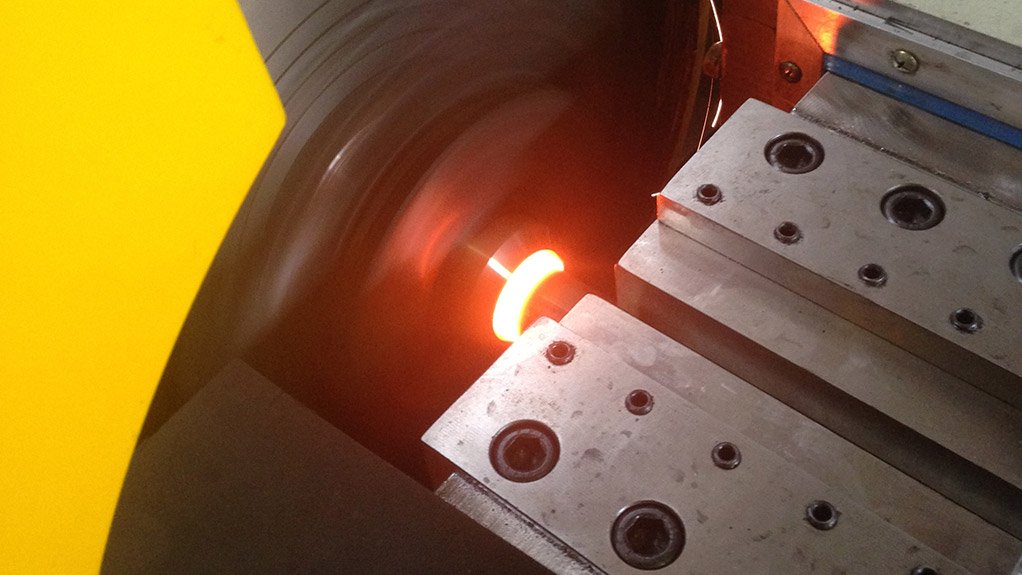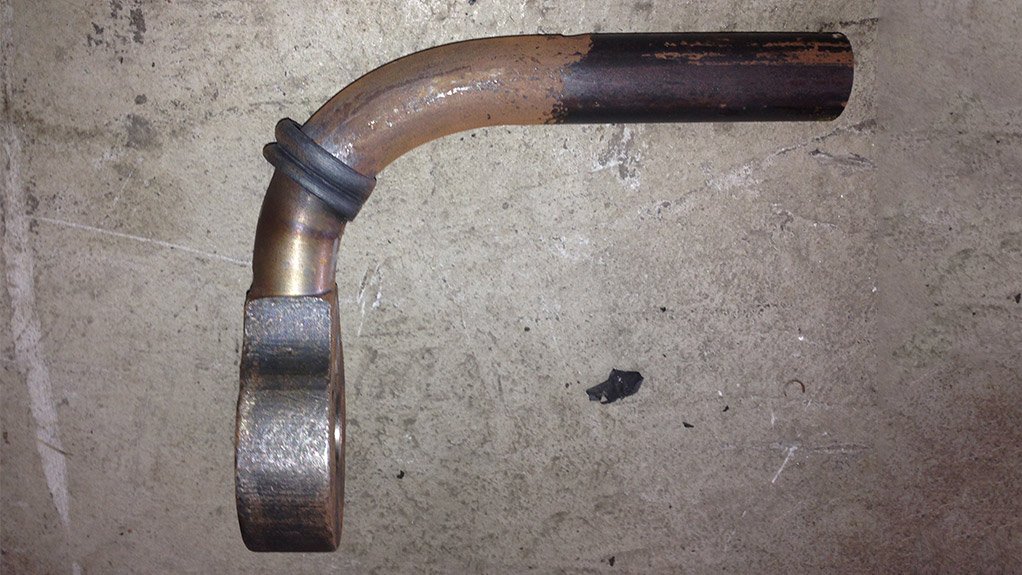Friction welding provides multiple benefits



FRICTION WELDING PROCESS The process entails heating two metallic components using friction, after which the components are forged together
MILD STEEL WELD Manapp Industries has not, to date, had a tensile test fail at the weld
Local friction welding and steel fabrication services provider Manapp Industries’ friction welding services have been pos- itively received by industry, as companies using these services have experienced improved weld quality and significant reduction in waste material, says Manapp director Shannon Frost.
“Manapp Industries was founded in January last year to tackle a need for quality friction welding services. It developed a close working relationship with engineering solutions provider Strocam Mining, which supplies engineered products to the railway industry,” he highlights.
Frost adds that Strocam Mining’s clients include State-owned rail operator Transnet.
Prior to the relationship, Strocam Mining had its products friction-welded at a small workshop close to the company’s premises in Olifantsfontein, in Midrand.
However, he says the welding work was substandard, small scale and undertaken on antiquated welding machines.
“Strocam Mining approached Manapp Industries in September last year and we have been responsible for the welding of their products since then,” notes Frost.
Friction Welding
Frost explains that friction welding is a process whereby two metallic components are heated purely by means of friction, and then forged together.
“Part A is clamped in place in a rotating chuck, with. . . part B clamped in place on the machine bed. The rotating chuck spools at about 1 000 rpm on average, with high-force levels being used to force part A against part B. . . to create friction to induce heat on both surfaces. After a predetermined amount of time – once the materials have entered a plastic phase – the two parts are forged together as the welding machine’s spindle comes to a halt.”
Frost notes that the entire operation can take from between 40 seconds to 120 seconds, depending on the materials used.
Process Advantages
“Friction welding enables a user to weld all types of metals, including copper and mild steel, together, which would traditionally not have been possible. Further, our in-house tests have proven that the welds are stronger than the original parent material,” Frost points out.
He notes that friction welding also retains the strength of the solid steel method, but saves on the bulk steel bought and the amount of scrap that is produced by machining down an oversized steel bar.
Frost stresses that Manapp Industries did not introduce friction welding to South Africa, as the process has been in use for several decades. However, owing to its niche nature, friction welding was predominantly used for in-house jobs and not outside of big manufacturers.
“Manapp Industries believes there are significant opportunities to develop the local friction welding industry, as there are many industries, such as the construction and manufacturing sectors, that could benefit significantly from using this service,” he explains.
Further, Frost adds that friction welding is well suited to other types of products, including vehicles, drive shafts, valves, overhead power line fixings, rail transport, boreholes, exploration piping and bolts.
“For example, bolt manufacturers can weld a steel rod to a steel disk instead of having to machine a bolt from a solid steel bar, with the remaining work confined to machining of the thread and hex head using friction welding.”
Frost notes that Manapp Industries adheres to ISO 15620: 2000 friction welding of metallic materials standards.
“Owing to the flexible nature of friction welding and our having a range of material sizes, combinations and types, we can weld products to customer specification requirements. Manapp Industries then conducts destructive tensile strength tests. . . to be 100% sure that the material join is as we expect it to be,” he states.
Frost says this testing forms part of the company’s quality control process to ensure “Manapp Industries’ work is of the highest quality”.
He adds that, to date, the company has not had a tensile test fail at the weld.
Service Offering
Frost says Manapp Industries can weld a range of materials and products, including stainless steel coupling rods, for use in the drive shaft assembly; mild steel welded onto stainless steel pump rotors for use in a water pump assembly; and mild steel roof anchors for use in the stabilisation of the upper wall in deep mining.
The company can also undertake drill-pipe rod-end welds for use in the borehole, gas and oil exploration drilling industry, as well as push-and-pull rod welds that are used to activate and deactivate the brakes on railway wagons, which is a critical safety item.
Frost adds that the company is also investigating the feasibi- lity of acquiring a specialised drill pipe friction welding machine to weld drill rod ends only.
“The machine will have an automatic unload and load feature, thereby negating the risks of having to move large pipes manually; it will also assist in impro- ving turnaround time for each weld. A final decision on whether the company will buy the new machine will be taken by the end of this year.”
Overcoming Challenges
Frost tells Engineering News that promoting the Manapp Industries service offering has not been too much of a challenge.
However, he says the company undertook many “sacrificial tests” on components to ensure that management approved of the process and that a fully pene- trated weld was achieved without too much material being taken away during the forge process.
“Once this was achieved, we were able to ensure that our welds were strong and that the welding process was time efficient, which is critical to ensuring that customers receive their products as quickly as possible.”
Frost says, to date, companies have generally been willing to learn about the advantages of friction welding.
“I am confident that, with government expenditure plans currently being approved for the railways and other infrastructural sectors, there will be plenty of opportunities for Man-app Industries – as a small com- pany – to achieve substantial growth in the next five to ten years,” he concludes.
Comments
Press Office
Announcements
What's On
Subscribe to improve your user experience...
Option 1 (equivalent of R125 a month):
Receive a weekly copy of Creamer Media's Engineering News & Mining Weekly magazine
(print copy for those in South Africa and e-magazine for those outside of South Africa)
Receive daily email newsletters
Access to full search results
Access archive of magazine back copies
Access to Projects in Progress
Access to ONE Research Report of your choice in PDF format
Option 2 (equivalent of R375 a month):
All benefits from Option 1
PLUS
Access to Creamer Media's Research Channel Africa for ALL Research Reports, in PDF format, on various industrial and mining sectors
including Electricity; Water; Energy Transition; Hydrogen; Roads, Rail and Ports; Coal; Gold; Platinum; Battery Metals; etc.
Already a subscriber?
Forgotten your password?
Receive weekly copy of Creamer Media's Engineering News & Mining Weekly magazine (print copy for those in South Africa and e-magazine for those outside of South Africa)
➕
Recieve daily email newsletters
➕
Access to full search results
➕
Access archive of magazine back copies
➕
Access to Projects in Progress
➕
Access to ONE Research Report of your choice in PDF format
RESEARCH CHANNEL AFRICA
R4500 (equivalent of R375 a month)
SUBSCRIBEAll benefits from Option 1
➕
Access to Creamer Media's Research Channel Africa for ALL Research Reports on various industrial and mining sectors, in PDF format, including on:
Electricity
➕
Water
➕
Energy Transition
➕
Hydrogen
➕
Roads, Rail and Ports
➕
Coal
➕
Gold
➕
Platinum
➕
Battery Metals
➕
etc.
Receive all benefits from Option 1 or Option 2 delivered to numerous people at your company
➕
Multiple User names and Passwords for simultaneous log-ins
➕
Intranet integration access to all in your organisation




















